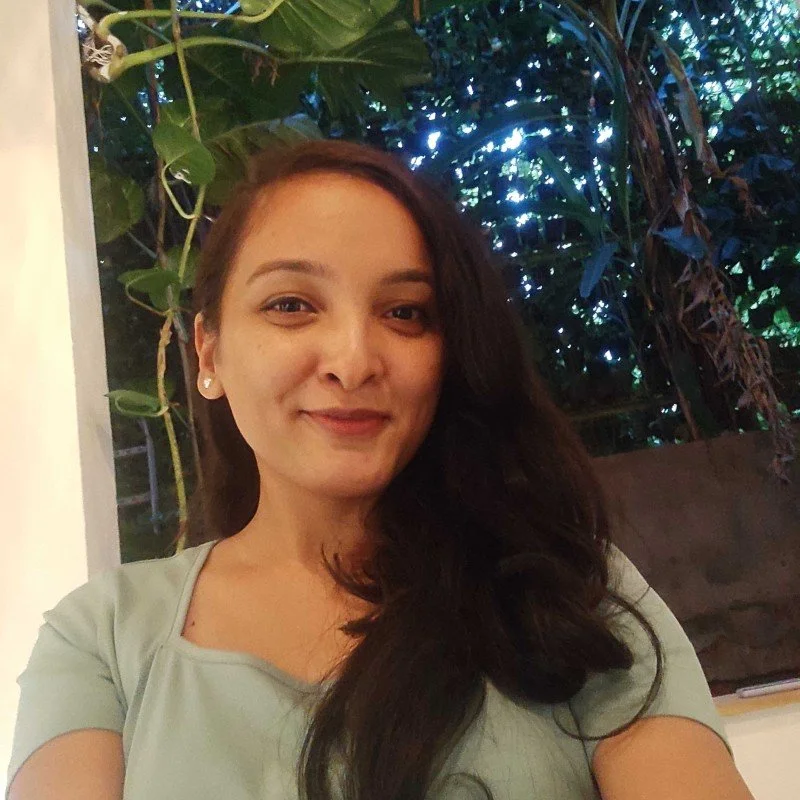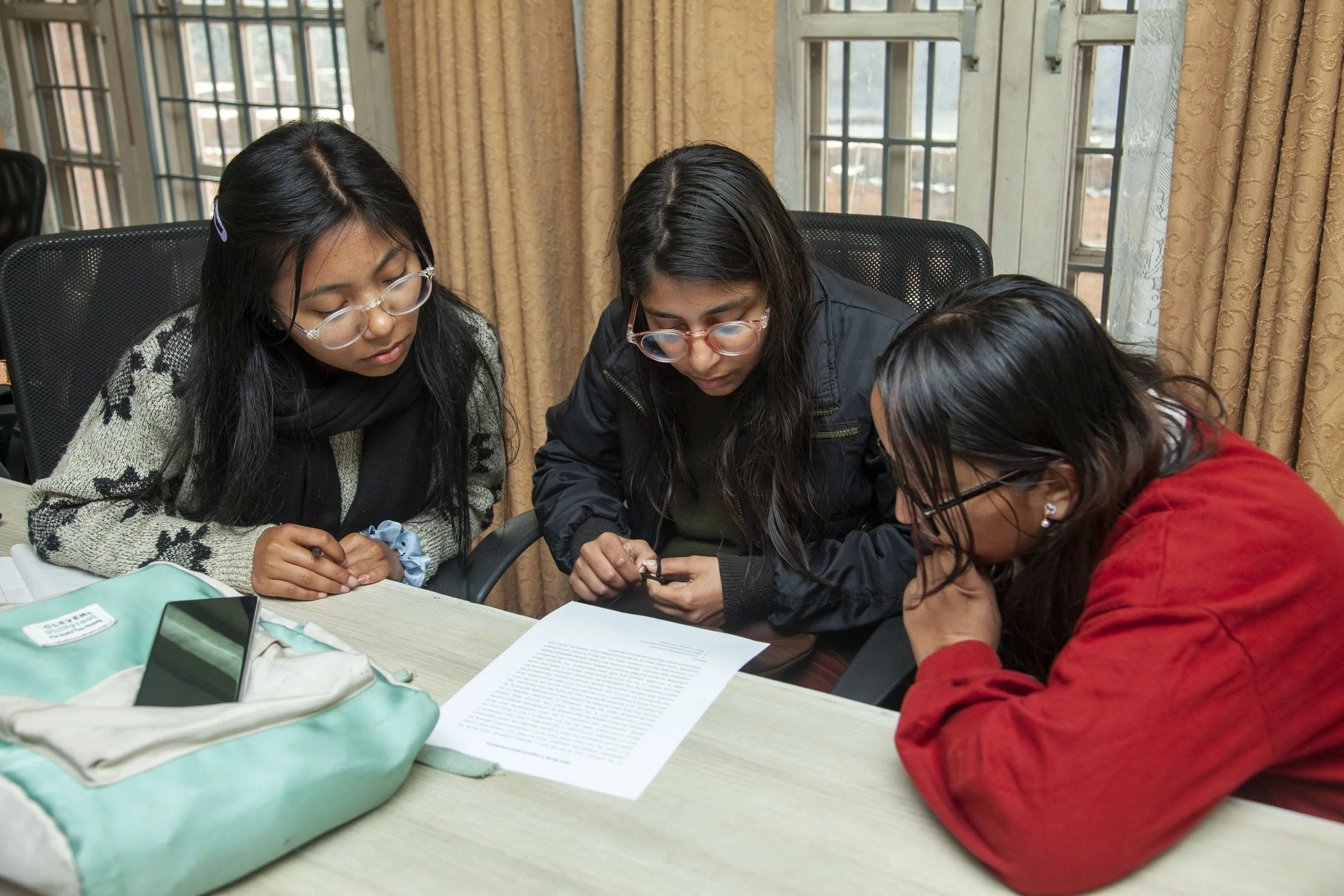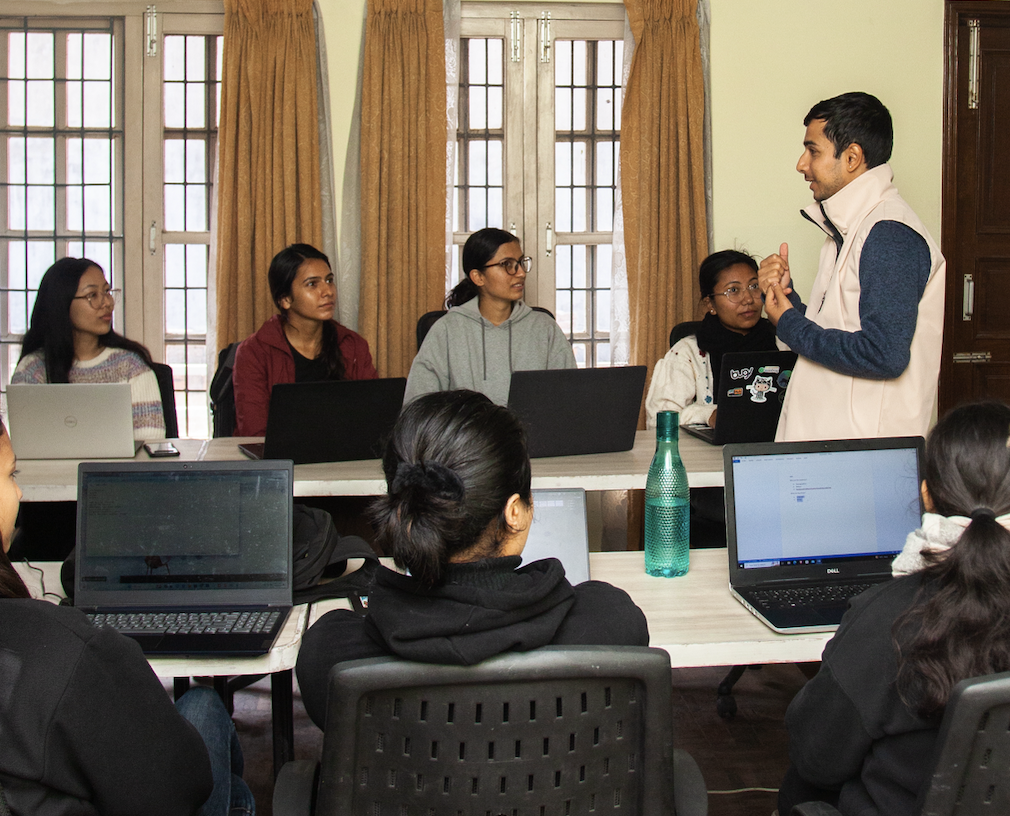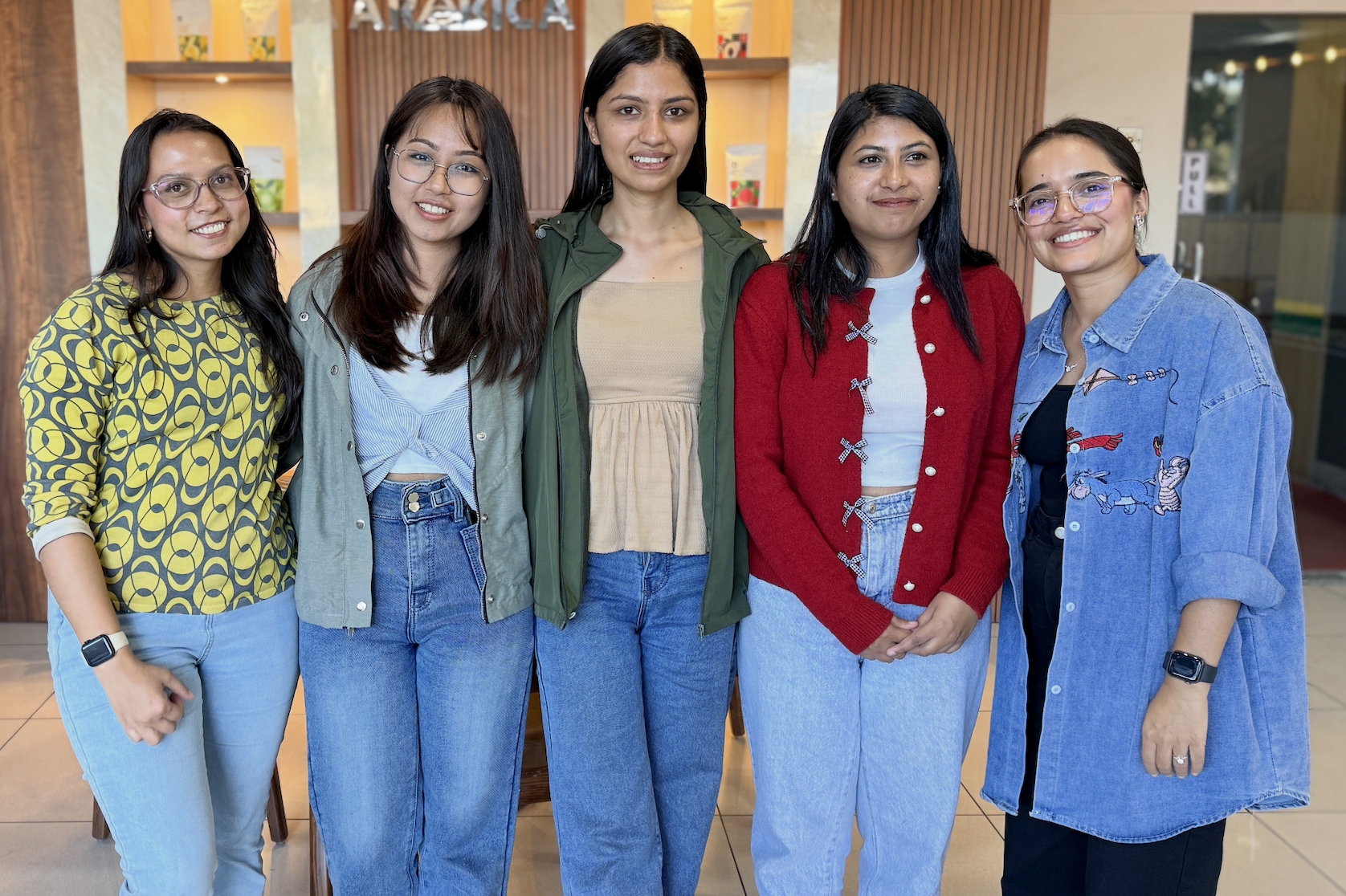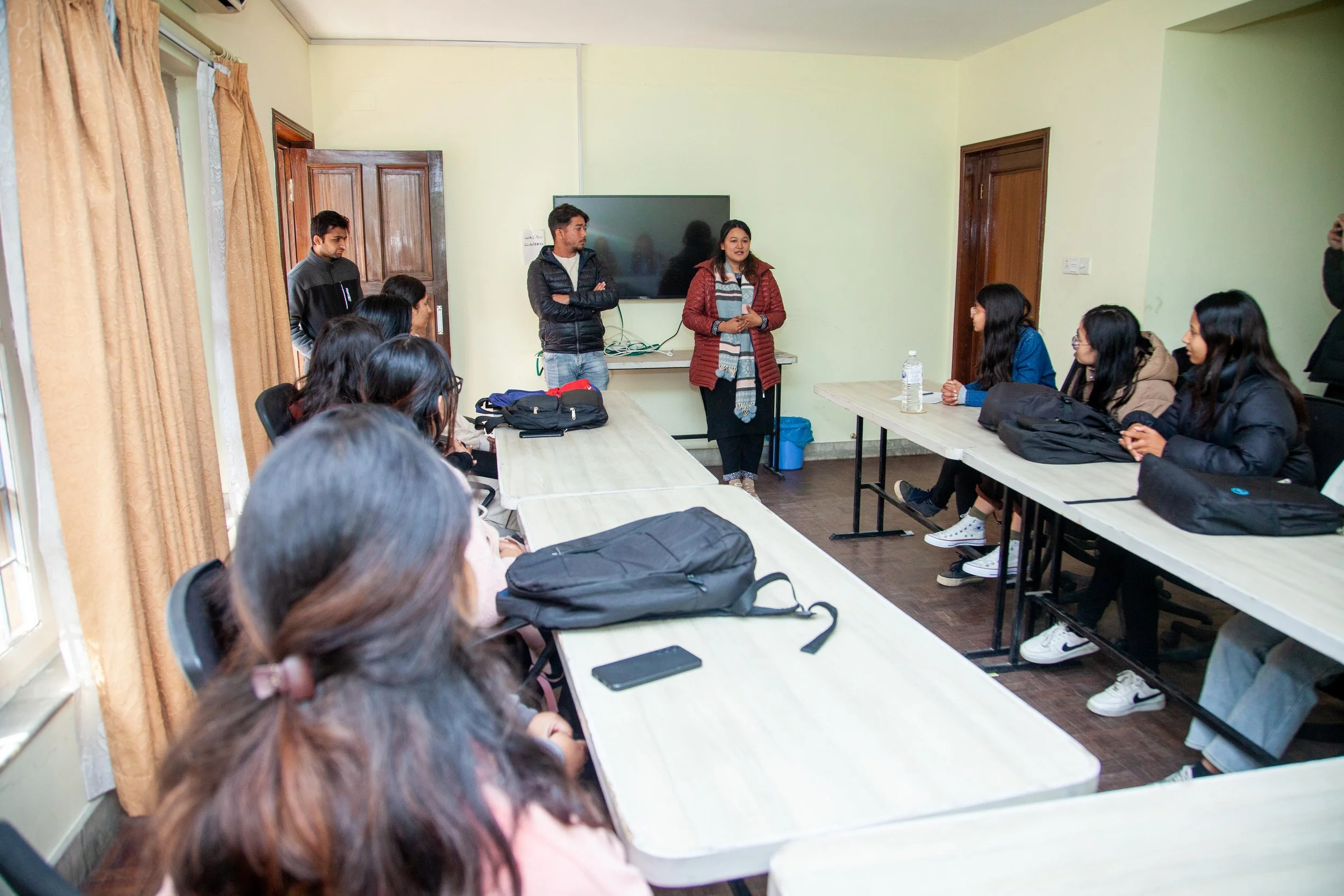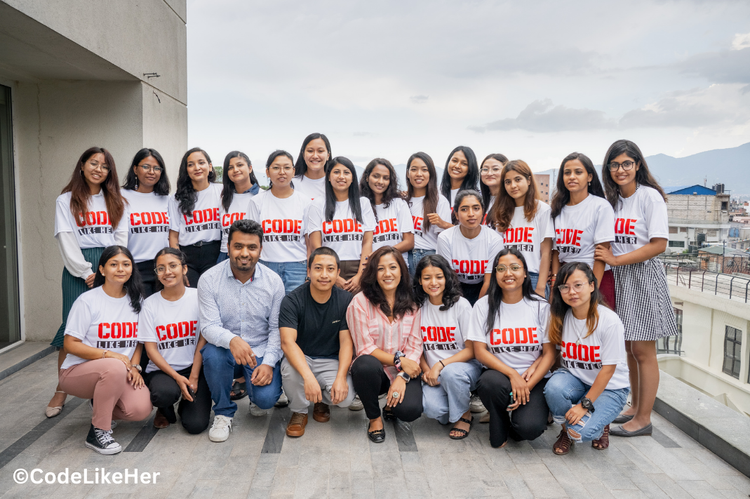Giving Tuesday 2025: How “Code Like Her” Helps Girls in Nepal Rewrite Their Futures
Code Like Her alumni
This Giving Tuesday, Compassionate Eye Foundation (CEF) is partnering with Kina Social Ventures to raise $7,500 CAD for Code Like Her—a program that transforms young women in Nepal from hesitant outsiders into confident tech leaders. Since 2022, Code Like Her has empowered dozens of girls to claim their space in STEM, breaking down barriers in one of the world's most male-dominated tech landscapes.
Our 2025 Goal: Fund the next cohort of Code Like Her, providing 15 to 20 young women with the mentorship, technical training, and community support they need to launch careers in technology.
Join us from Friday, November 28 through Thursday, December 4, 2025 as we kick off our donation campaign. Every contribution helps a girl go from feeling invisible to leading with confidence, creating ripples that empower entire communities.
Read the stories below from an alumna, a mentor, and the program's founder to see the transformation your support makes possible.
Part 1: Finding Her Code
Kritika's Journey to Confidence and Belonging in Tech
By Kritika Baral, Code Like Her Alumna
Kritika Baral, 2020 alumna of Code Like Her, now a Senior Designer at a top digital agency in Nepal
Growing up in Kathmandu, Nepal's bustling capital, I was surrounded by the hum of technological development—startups popping up, apps changing daily life, endless talk of innovation. But as a girl in a community where STEM was still largely seen as a boys' club, I felt like an outsider peering in.
My family valued education deeply. My parents encouraged me to study hard, but the subtle messages were clear: tech was for the boys who tinkered with gadgets, not for girls like me who were expected to pursue "safer" paths. Before Code Like Her, "belonging in tech" felt like chasing a mirage—distant, intimidating, constantly out of reach. I questioned myself endlessly: Could I really fit into a world where girls were rarely seen, let alone heard? The doubt gnawed at me, making every curiosity about coding or design feel like a forbidden dream.
When I joined Code Like Her, a fellowship by Code Rush, I had no idea it would rewrite that narrative. I signed up thinking it was just a quick course to dip my toes in, but it turned into something transformative. Stepping into that classroom full of other girls—many of us starting from scratch—was both exciting and terrifying. We learned the basics: understanding code, navigating editors, building simple projects. But it wasn't just about syntax. It was about building a community where we supported each other.
The Moment I Almost Quit
Students in a class
One hard moment stands out vividly—the third session, when we were tasked with creating our first interactive webpage. I stared at the blinking cursor for what felt like hours, fumbling with HTML and CSS. Errors piled up: my layout broke, colors didn't align, and I couldn't get the buttons to respond. Frustration turned to tears. I felt overwhelmed and whispered to a mentor that I was ready to quit. Why am I even trying? This isn't for me.
What changed my mind was the gentle encouragement from the mentors and my peers. They gathered around, walked me through the bugs step by step, and shared their own struggles. One mentor said, "Kritika, every developer has faced this—it's not about being perfect right away; it's about persisting."
That moment of collective support reminded me I wasn't alone. Seeing the other girls nod and share similar stories flipped a switch. I went back to my code, fixed it line by line. And when the page finally loaded as intended, a wave of determination washed over me. I decided to push through because, for the first time, I saw that quitting would mean giving up on the belonging I was starting to feel.
The Rush of Creating
The first time I truly felt like a developer was during that same project turnaround. As my webpage came alive, buttons clicking, elements responding just as I envisioned, I leaned back and grinned. It wasn't flawless, but it was mine. That rush of creating something functional from lines of code made me realize: I wasn't just learning; I was building. It was empowering, like unlocking a door I didn't know existed.
Fast forward to today, and "belonging in tech" feels entirely different—it's home. As a Senior Designer at a leading digital agency in Nepal, I shape user experiences, collaborate with developers, and lead design sprints that impact thousands. Now, I walk into meetings with confidence, knowing my voice matters and my ideas drive real solutions. The program didn't just give me skills; it gave me the self-assurance to claim my space.
Skills That Translate Daily
From the bootcamp, the skill I use most frequently at work is problem-solving through iterative design and basic front-end coding. Whether prototyping wireframes or tweaking responsive layouts with HTML/CSS and a bit of JavaScript, that foundational debugging mindset helps me collaborate seamlessly with dev teams. It turns abstract ideas into tangible products, and I rely on it daily to ensure our designs are user-friendly and functional.
The changes in my income and schedule stability have been life-changing at home. Before, juggling part-time gigs meant unpredictable hours and financial stress—late nights worrying about bills or helping with family expenses. Now, with a steady salary and a 9-to-6 rhythm, I've been able to contribute more reliably to my household. There's a sense of security that lets us plan for the future without constant anxiety. It's not just about money; it's about the peace that comes from stability, allowing me to focus on growth rather than survival.
To Every Girl Who Wonders
To a younger girl wondering if tech is "for her," I'd say: It absolutely is, and you're already more capable than you think. I was that girl once—full of doubts in a male-dominated world—but Code Like Her showed me that curiosity is your superpower. Don't let anyone tell you otherwise. Start small, ask questions, and surround yourself with supporters. Tech needs your unique perspective. Step in, and you'll find you belong more than you ever imagined.
And to anyone considering donating to make programs like Code Like Her possible: Your support isn't just funding a course—it's igniting futures. Every contribution helps a girl like me go from feeling invisible to leading with confidence, creating ripples that empower entire communities. In Nepal, where opportunities for girls in tech are scarce, your generosity builds bridges to equality. Invest in us; we're the innovators who will change the world.
My journey with Code Like Her is proof that with the right encouragement, girls don't just enter tech—they thrive in it.
Part 2: Mentoring the Future
Guiding Hearts and Minds in Code Like Her
By Avash Parajuli, Code Like Her Mentor
Code Like Her students in class with one of their tutors
As a passionate advocate for personal development and empowerment, with a background in business administration and community building, I've always been driven to help others unlock their potential. Growing up in Nepal, I witnessed the challenges many young people—especially women—face in pursuing their dreams amid societal expectations and limited opportunities.
When I joined Code Like Her as a mentor for its inaugural batch in 2022, it was an exciting chance to contribute to a program founded by Astha Sharma at Code Rush. This fellowship aims to empower young girls from diverse backgrounds to thrive in STEM, and my role focused on guiding them beyond the code—helping them build resilience, confidence, and life skills to navigate a male-dominated field. Mentoring those first participants wasn't about technical instruction; it was about inspiring them to envision brighter futures and equipping them with the tools to achieve them.
Bridging the Confidence Gap
One of the most common gaps I see in learners, particularly young women in Nepal entering tech, is a lack of self-belief and life navigation skills—things like goal-setting, handling setbacks, and building networks—stemming from cultural norms that undervalue their ambitions. They often doubt their place in STEM before even starting, compounded by limited exposure to role models or career planning.
Our curriculum closes these gaps by integrating holistic mentorship sessions alongside technical training: workshops on personal branding, emotional intelligence, and work-life balance, with reflective exercises and one-on-one guidance to turn introspection into action. By framing challenges as growth opportunities and connecting them to real-life applications, we help bridge the divide between learning skills and applying them confidently in professional and personal contexts.
Making Online Learning Work in Nepal
Making online learning work in the Nepal context requires adaptability, given issues like inconsistent connectivity, varying schedules due to household duties, and the need for a supportive community. We addressed connectivity by offering asynchronous resources: recorded guidance sessions, downloadable reflection prompts, and text-based check-ins that work on low-bandwidth devices.
Timings were flexible, with evening or weekend slots to fit around school, work, or family. We encouraged Slack groups for motivation sharing, virtual peer circles for accountability, and alumni stories to build a sense of belonging—turning potential isolation into a network of encouragement that's crucial in a country where in-person gatherings can be challenging.
Beyond the Code
What makes Code Like Her truly valuable is its emphasis on soft skills that complement the technical training, preparing participants for holistic success. While the program covers essential tech stacks like web development tools, my focus was on building resilience through mindset shifts, effective communication via storytelling exercises, and leadership skills like decision-making and collaboration.
These aren't secondary—they're integrated to help girls not just learn code but advocate for themselves, negotiate opportunities, and lead teams. In Nepal's competitive job market, where women often face biases, this combination equips them to overcome obstacles and turn technical knowledge into impactful careers.
Creating Spaces of Belonging
Nurturing belonging for women in a male-dominated field is central to my approach as a mentor. I create inclusive spaces by facilitating open dialogues where participants share experiences without judgment, and I actively highlight their strengths to counter internalized doubts. We discuss stories of women who've succeeded despite odds—both locally in Nepal and globally—to make success feel attainable.
As a mentor, I practice allyship by listening first, amplifying their voices in group settings, and challenging stereotypes gently—like reframing "I can't do this" to "What support do you need to try?" It's about consistent encouragement: validating emotions, celebrating personal milestones, and reminding them that their perspectives, shaped by unique Nepali experiences, are vital for innovating in tech.
A Story That Moves Me
One student success story that always moves me is from Pooja, who joined with heavy family pressures and little confidence in her path. Through our sessions on life planning, she identified her passions and created a roadmap, which included seeking internships. A year later, she's not only in a tech role but also mentoring her siblings and community, saying our talks gave her the courage to persist. Hearing how those conversations shifted her trajectory still inspires me—it's the emotional impact that lingers.
What Success Looks Like
For me, success 12 months after graduation looks like empowered independence: participants pursuing tech-related opportunities with confidence, whether in jobs, further studies, or entrepreneurial ventures, while maintaining work-life harmony. It's seeing them apply life skills—networking to land roles, resiliently handling rejections, or advocating for inclusivity in their workplaces.
Emotionally, it's about them owning their narratives: mentoring others, contributing to community projects, and viewing themselves as leaders. In Nepal's dynamic landscape, true success is when these women aren't just participating in tech but transforming it, fostering more equitable spaces for the next generation.
Mentoring in Code Like Her has enriched my own journey, showing me that true change comes from guiding hearts as much as minds. If you're inspired to support such initiatives, consider donating or volunteering; every effort helps build a more inclusive Nepal. Let's empower the future, one story at a time.
Part 3: Rewriting the Story
The Vision Behind Code Like Her
By Astha Sharma, Program Coordinator, Code Rush
From L-R: Program Coordinator, Astha Sharma, alumni, Yunika Bajracharya, Pratima Dawadi, Kriti Prajapati (all working at IT companies), and Melisha Ghimire, Managing Director, Code Rush. Yunika is creating an AI chatbot to connect Nepali women in remote areas with legal assistance.
As the managing director of Code Rush, the platform that powers Code Like Her, I've dedicated my career to bridging the gap in Nepal's tech industry, particularly for women and girls who have long been underrepresented. My journey began in a small village in Nepal, growing up in a family with a working mother and a stay-at-home father. From an early age, I was driven to challenge gender norms, often finding myself as the only woman in rooms full of men—a pattern that started when I chose engineering as my field of study and has continued throughout my corporate journey.
I frequently had to assert myself loudly to be heard in discussions about women's issues, inclusivity, and even my own career path. Unsatisfied with the status quo, and armed with over nine years of experience, I founded Code Rush and initiated the Code Like Her program together with my partner David, aiming to create real change.
Why Code Like Her Exists
The inspiration for Code Like Her comes directly from my personal experiences navigating male-dominated STEM spaces. In college, I was one of only five women in a class of 48, which starkly highlighted the barriers many girls face before even entering the field. This motivated my first steps into advocacy: I started a girls' group to amplify our collective voice, build confidence, and encourage participation in competitions and hackathons that were often viewed as "boys' territory."
Years later, stepping into the tech industry, I saw the same patterns persist—in meeting rooms, coding workshops, and leadership discussions, women remained the minority. That realization fueled my determination: I didn't want another generation of girls to feel invisible or hesitant to claim their space in technology.
When I founded Code Rush, we knew it was the perfect platform to make a difference. That's when Code Like Her was born—a fellowship designed to empower girls through mentorship, skill-building, and community. At Code Rush, we ensure every project includes guidance and support, helping participants take those crucial first steps, gain confidence, and realize they belong in STEM. Our work is rooted in the belief that small encouragements, paired with opportunities and mentorship, can ignite potential and drive lasting change.
Code Like Her students during orientation
Building From Day One
From the very first session, David and I wanted the girls to feel seen, supported, and capable. The initial workshops struck a delicate balance between teaching foundational skills and fostering confidence. Many participants arrived with little to no prior experience, so we started with the basics: understanding what code is, how it works, and even navigating a code editor. Every session was crafted not just to teach programming, but to create an environment where asking questions was encouraged and failure was viewed as a stepping stone.
Conducting Code Like Her has been profoundly rewarding. I recall one cohort where a shy girl, initially hesitant to speak, stayed after sessions to debug her code, seeking advice and encouragement. By the final presentation, she stood tall, confidently showcasing a project she built entirely on her own. Another student, who once doubted her abilities, has now become a mentor, guiding the next generation. It's incredible to watch these transformations unfold.
Growing Stronger Together
Over time, we've refined the program to include mentorship at every level. Alumni are invited back to mentor new participants, building a network of support and inspiration that extends beyond the classroom. We've also integrated real-world projects to encourage problem-solving, creativity, and exposure to tech opportunities that might otherwise remain out of reach.
For me, Code Like Her is about rewriting narratives. It's about ensuring girls never feel outnumbered, unheard, or incapable in spaces historically built for men. It's about providing the tools, mentors, and courage they need to succeed—not just as coders, but as future leaders, innovators, and role models. Every classroom I enter, every project I oversee, and every mentee I inspire is a step toward a more inclusive tech ecosystem in Nepal.
The Change We're Creating
Growing up, I often noticed how boys were encouraged to tinker with gadgets, explore computers, or dream of engineering careers, while girls were steered toward "safe" paths. It bothered me—not because girls weren't capable, but because no one gave them the chance. That feeling intensified in my engineering classroom, where out of 50 students, only five were girls. I felt invisible at times, wondering why more weren't there: discouraged at home, never told they belonged, or doubting themselves before even trying.
When I started Code Rush, we knew change was needed. Code Like Her became more than a coding program—it's a community where girls learn, ask without fear, and see others like them succeeding. We've seen shy participants present with pride, doubters dream big, and graduates mentor others, multiplying the impact.
My dream is clear: classrooms filled with girls who code, innovate, and lead without hesitation. Because when girls know they belong, the world changes.
Code Like Her alumni
Support 20 GIRLs Like KRITIKA This Giving Tuesday
Donation Page Live: Friday, November 28 – Thursday, December 4, 2025
Your contribution to the Community Empowerment Foundation directly funds the next generation of Code Like Her participants. Every dollar helps provide:
Technical training and mentorship
Access to learning resources and tools
A supportive community that lasts beyond graduation
Career guidance and networking opportunities
Together, we can ensure that no girl in Nepal has to wonder if tech is "for her."


